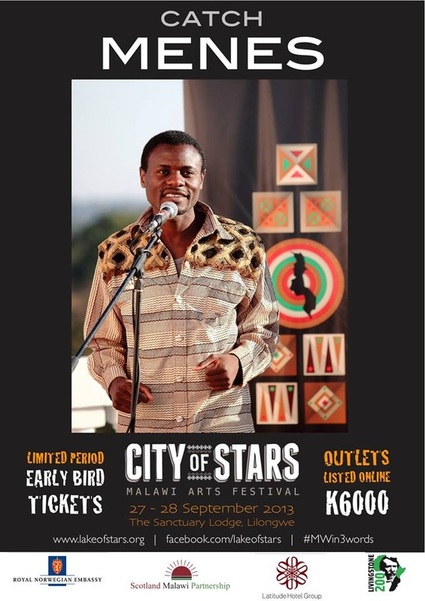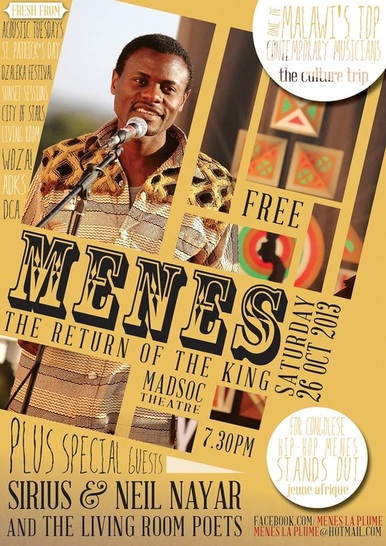|
The following essay is one I wrote for my current INDEV course (edited a little to shorten!), and shares the story and art of a friend of mine who lives in Dzaleka Refugee Camp. A powerful wordsmith and captivating performer, Trésor Nzengu, also known as Menes La Plume, is bringing attention to the trials refugees experience through his work. He writes and performs hip-hop and slam poetry, primarily focused upon the difficulties that he and his friends have faced as refugees. Although the arts culture in Malawi is rather small, he has successfully built a fan base and performs regularly at events in and around Lilongwe. Trésor is from the Democratic Republic of the Congo, where he became a local celebrity, performing live around the country, and on television and radio shows. Unfortunately, a few years ago, his work, always aimed at creating change, was interpreted as being written against the government and regime in place in the DRC, and Nzengu had to flee for his life. He eventually arrived in Malawi and has since been living in Dzaleka Refugee Camp, where he has been inspired to write pieces that express the experiences that fellow refugees share with him. Trésor primarily writes and performs in French, but has begun to also work in English, and does also incorporate some Swahili and Lingala into his poetry. As an artist of words, Trésor is motivated by effective communicators such as Mahatma Gandhi and Martin Luther King Jr., and in an interview, stated that his aim to change the world by changing people’s minds and raising awareness of the struggles that Africa is facing. His work, beautifully constructed poems that are performed dramatically with a backdrop of talented vocalists and musicians (usually fellow refugees), are emotionally complex, and take the audience from the highs of an easy life to the lows of extreme loss. One powerful piece, ‘A Quoi Bon’ or ‘What Is Good’, is particularly morose, examining the futility of life in the refugee camp, and Nzengu bares his soul when he writes “Vivant avec larmes aux yeux toujours en quête du bonheur qui ne se trouve nul part ici bas – a quoi bon!”, or “Living with tears in his eyes, always in search of happiness which is nowhere down here – what is good!” Another poem, entitled ‘Dans La Peau D’Une Fourmi’ or ‘In The Skin Of An Ant’, draws a comparison between his experiences as a refugee and the strengths and weaknesses of an ant. One of Trésor’s few poems in English, ‘Imagine’, was written for World Refugee Day 2013, and graphically describes stories of refugees that he has met in Dzaleka Refugee Camp. It contains the haunting refrain: “If it happened to others, it can happen to you too. At every performance I have seen of ‘Imagine’, it has brought audience members to tears and has spurred conversation regarding refugees and the events that precipitated their need to flee. This is exactly what Trésor had hoped to spark through writing these stories into a poem – to humanise and change the perception of refugees to those who do not see them as individuals. Nzengu does not perceive his work as being political, arguing that although it may contain political themes in dealing with refugee stories and opinions, he is not trying to be political, and is rather trying to speak on behalf of the people who are scared to share their stories outside of the safety of their houses. I would argue that contemporary art is a reflection of the culture it represents, and as such, is inherently political, though it may not contain outright political statements. The content of Trésor’s poetry, the stories of refugees, inevitably involves politics as it describes the circumstances that led to families fleeing their homes, and as such, although he does not consider his work political, I believe that it is. Nzengu’s work is politically significant in Malawi, as it depicts the lives of the refugees that currently reside in Dzaleka Refugee Camp and his opportunities to perform in front of Malawian and international politicians could change the perception of refugees’ residency in Malawi. A secondary argument for the political content and context of Nzengu’s work is that an interpretation of some of it was the inciting incident that resulted in him becoming a refugee. Once again, although Trésor does not want his work to be perceived as political, it clearly has been, and as such, has a political significance in that context. Trésor does consider himself to be an activist and is energetically trying to change the society that he has found himself immersed in. At his shows and performances, he often shocks the audience with graphic words and images of the trauma that refugees and residents in conflict-ridden areas experience, and challenges them to use the shock to share with others and make change happen. He has been able to perform at an annual concert weekend in Malawi, at the Lilongwe community theatre, various business and networking events, and at multiple embassies, sharing his art and raising the profile of the refugees in Malawi. Trésor considers his work a success when he is able to help his listeners understand that refugees are people just like them, with potential, skills, and an uncontrollable circumstance that has resulted in them becoming refugees. Trésor also performs within Dzaleka Refugee Camp, and has found that his fellow refugees appreciate hearing their stories through his artistic interpretation, and that they also find hope in the fact that he is able to perform outside of the camp, as they can believe that one day they can grow beyond being a refugee and succeed as well. Nzengu began a Cultural Association within Dzaleka Refugee Camp as a way to give resident artists a way to network and regain their inspiration to create, and is an active member of the Lilongwe Poetry Club. He stopped writing for four years after arriving in Dzaleka, and has credited his current emotional health to the creative outlet that he found when he began to write again. The actions of Trésor to create a space for the arts within the camp are resulting in a greater willingness among refugees to share their stories publicly, and the reincorporation of the arts into daily life is contributing to individual’s healing process from the trauma of the past
Trésor Nzengu is an inspiring and powerful artist, who is using his skills to manipulate words into a tool of change. The unconsciously political nature of his work is modifying Malawian and foreigner’s opinions of refugees within Malawi, and is increasing the dialogue surrounding their circumstances. Trésor’s poetry is creating social changes within the city of Lilongwe and Dzaleka Refugee Camp, helping refugees to voice their stories without fear, and heal from the trauma they have experienced.
2 Comments
Timeless
24/2/2014 10:19:49 am
I love this sentence: "the reincorporation of the arts into daily life is contributing to individual’s healing process from the trauma of the past". Healing must be holistic. Expressing oneself through the gifts of artistic expression provides a unique means of processing pain and validating one's experiences. Thank you for making us aware of Tresor's gift.
Reply
Leave a Reply. |
AuthorWelcome! My name is Katiana and I am a development professional pursuing my dream to live out Isaiah 1:17 to the best of my abilities. I am passionate about teaching and working with vulnerable families and children to improve their lives sustainably.
CaveatThis blog is composed of my personal opinions, which do not necessarily reflect the opinion or views of institutions or organizations that I may be or have been affiliated with.
Categories
All
Archives
July 2017
|




